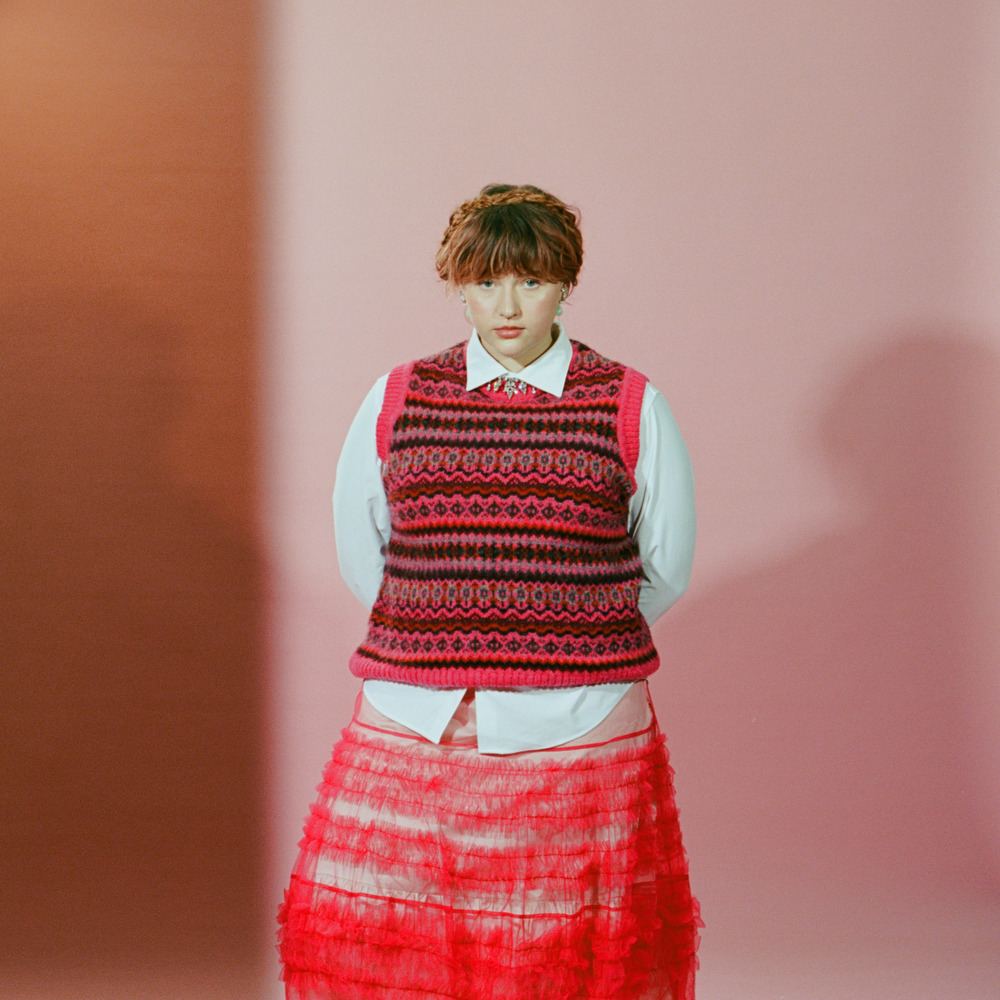Karin Ann is the Gen Z alt-pop icon speaking up for Eastern Europe’s queer community

Introducing Karin Ann, the Slovakian singer fighting for queer people in Europe. (Supplied)
To many, Karin Ann is an alt-pop newcomer. To Karin Ann, she’s something of an old-timer, and she’s only 21-year-old.
The Slovakian singer released her debut, English language single “3AM” back in 2020, but she’d written it back in 2017, aged just 15. It’s a brooding slice of melancholic trap-pop, but it feels worlds away from the music she’s pumping out now, just three years on.
Her recent single, “if i fall for you” is a slow-burning alt-rock song, its gritty bassline weaving perfectly between her dulcet voice. It sounds instinctive.
“At first, I had an idea of what I needed to present myself in order to be taken seriously,” Karin Ann tells PinkNews, speaking via Zoom from her home country. She’s sat in what looks like a shed.
At 15, she already knew what the music industry machine was like, and that if she was to succeed, she’d be up against “rooms full of 50-year-old white men”.
“I wanted to be taken seriously in an industry that’s hard to be taken seriously in, especially as a woman, and as a queer woman,” she states. She felt “pressure” to be what the industry expected: a big pop machine.
Now, she’s working with new collaborators, and has reverted back to the inspirations she grew up around, including queer icon Freddie Mercury and singer-songwriter Birdy. “I feel like I can also be a bit more free in my songwriting, because I’m a lot more confident in it,” she says.
Confidence, it turns out, is an essential trait when you’re being dubbed an “icon of the LGBTQ+ community” by the likes of Vanity Fair and Forbes. As a queer artist, she’s content with who she is now, but it wasn’t an easy path to tread.
She grew up in conservative Slovakia, a country that even in 2023, has a troubling record when it comes to LGBTQ+ rights.
Earlier this year, the state came frighteningly close to blocking legal recognition for trans people, while same-sex marriage is still banned. In October last year, two people were murdered in an anti-LGBTQ+ hate crime outside a queer bar in Bratislava, the country’s capital.
While Slovakia’s stance on LGBTQ+ rights is worrying, little is said about it in the mainstream press.
Does Karin ever feel that the country’s community gets ignored? “I feel like it definitely does,” she says. “But in general, I just feel like it’s really hard to find somebody here who’s super open about it… it took me a long time to come to terms with who I was and it would definitely have been helpful having queer media or like queer conversations, which just was not a thing.”

Alongside her daunting “LGBTQ+ icon” title, the singer-songwriter has been heralded as the “voice of Gen Z” by more than one publication. It’s probably down to the jaded teenage ennui that floods the lyrics on her 2022 EP side effects of being human.
On the peachy “i’m a loser”, she hums about her “broken mind… overthinking s**t daily”; on the Olivia Rodriguo-esque “we’re friends, right?”, she decries an ex-lover who has replaced the photo of her from behind her phone case with one of a new partner.
The title could also be because Gen Z are often the ones leading the charge when it comes to activism, and in Karin Ann’s career, activism has already played a big part.
In 2021, while performing on Polish state TV, she pulled out a Pride flag in defiance of Poland’s notoriously poor record on LGBTQ+ equality.
“I would like to dedicate this song today to the LGBTQ people here in Poland, because I know don’t have it easy here,” she said, wrapping the flag around her shoulders. “You deserve to be loved, and you deserve to feel safe.”
Afterwards, she switched her phone off and continued on to her next destination. Hours later, she turned her phone back on and saw that the performance had gone viral.
“It had like a huge fallout; it kept snowballing and never really stopped snowballing,” she reflects now. Yet, despite the intense reaction, she would do it again.
“I can be impulsive when it comes to things like this,” she says. “I never would plan to be like, ‘oh, look, let’s do this thing’, [but] if something happens, it happens. It’s not like I’m now, because of how big it got, never going to speak about anything again.”
Plus, it worked, to a degree; huge celebrities like Spice Girls’ Mel C and The Black Eyed Peas have since made statements of their own in protest against Poland’s hostility towards queer people.
Another positive that came out of the whole ordeal? Her music found a whole new audience. In an industry that’s exceptionally difficult to crack, that’s no bad thing.
“You have so many extremely talented new people [which makes] breaking through super difficult for anybody,” she says. Karin Ann might not be a household name, but she has got an impressive 50,000 monthly listeners on Spotify, and that’s got to be worth something. “I still feel like I should have achieved more in this time than I did,” she admits.
Still, she’s releasing music at the same speed as her industry colleagues. In June, she dropped her new single “bittersweet heartbreak”, a throbbing folk-rock song dedicated to a former lover. It opens with the gloriously Gen-Z line: “I can’t even listen to ‘Happier Than Ever'”– a reference to the 2021 Billie Eilish song.
It turns out that she got with the lover in question during a Billie Eilish concert in Prague. While Eilish sang her heart-wrenching song ‘i love you’, Karin Ann and her mystery partner were stood mouthing the words at each other. Sadly, it didn’t work out.
“I was processing a lot of it for a long time. I was in denial. I went through the whole five stages of grief,” she laughs. “I went through the anger. I went through the sadness.”
Billie Eilish playing, first love in tatters, and a want for a better world. Perhaps Karin Ann isn’t the voice of a generation; she’s just living through these tumultuous times like any other young person, as best as she can.
“Bittersweet heartbreak” is out now.

